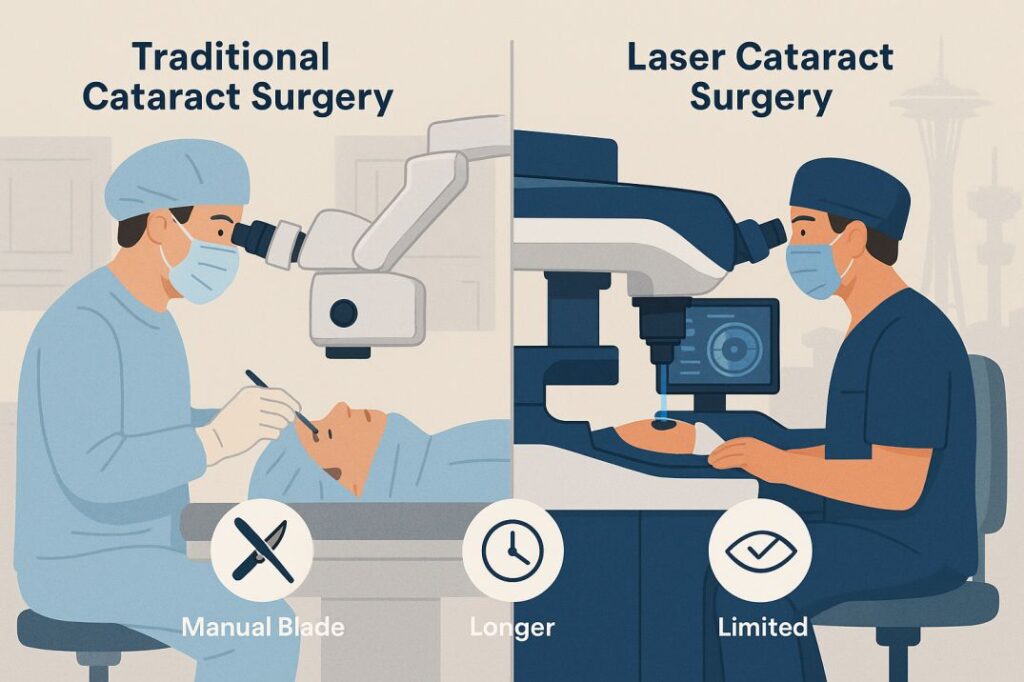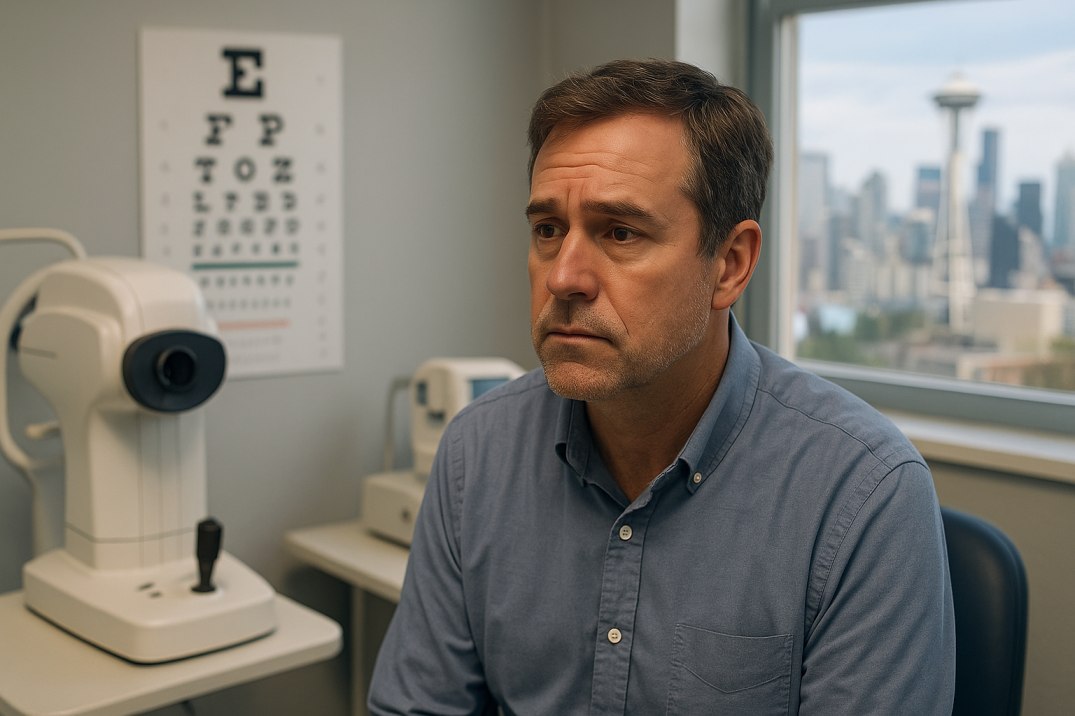Laser Eye Surgery Costs & Recovery in Seattle
Laser Cataract Surgery: Precision Technology Explained
Laser cataract surgery uses computer-guided femtosecond lasers to perform critical steps with micron-level accuracy, surpassing manual techniques. At Cannon EyeCare, this means:
- 3D Eye Mapping: Custom digital blueprint of your eye
- Automated Incisions: Bladeless corneal openings
- Cataract Fragmentation: Laser softening of cloudy lenses
- Astigmatism Correction: Reshaping during IOL implantation
Why Seattle Chooses Laser Technology:
- Accuracy: Reduced human error in complex procedures
- Faster Recovery: Many return to hiking/driving within days
- Visual Freedom: 80% reduction in glasses dependence post-surgery
Laser vs. Traditional Cataract Surgery: Seattle-Specific Comparison
Traditional Surgery (Trusted Standard)
-
Manual Technique: Surgeons use precise handheld tools
-
Proven Safety: Decades of successful outcomes
-
Seattle Accessibility: Widely available at most clinics
Laser-Assisted Surgery (Advanced Precision)
-
Computer-Guided: Femtosecond laser automates incisions
-
Gentler Process: Reduced ultrasound energy = less tissue stress
-
Seattle Advantage: Preferred for complex cases at Cannon EyeCare
Key Differences for Seattle Patients:
-
Incision Method
Traditional Surgery: Manual blade technique
Laser Surgery: Computer-guided precision -
Astigmatism Correction
Traditional Surgery: Limited effectiveness
Laser Surgery: Built-in accuracy during procedure -
Customization Level
Traditional Surgery: Standard approach
Laser Surgery: Personalized 3D eye mapping -
Cost Considerations
Traditional Surgery: Typically fully covered by insurance
Laser Surgery: Additional $1,000-$2,000 investment (common at Seattle premium clinics) -
Recovery Profile
Traditional Surgery: Proven return to daily activities
Laser Surgery: Often faster return to hiking/driving (advantage for active Seattleites) -
Ideal Candidate Profile
Traditional Surgery: Standard cataracts with no astigmatism
Laser Surgery: Complex cases, astigmatism correction seekers, or tech-adopting patients
Which Is Right for You?
Both methods deliver excellent vision restoration. Consider laser surgery if you:
-
Have astigmatism requiring correction
-
Prioritize precision for activities like driving or sailing
-
Prefer minimized recovery time (critical for Seattle’s active lifestyles)
Laser Cataract Surgery Safety: Seattle Specialist Insights
Laser cataract surgery demonstrates excellent safety comparable to traditional methods. Potential risks include:
-
Infection (less than 0.1% at certified Seattle centers)
-
Temporary inflammation
-
Rare retinal complications
Seattle-Specific Advantages:
-
Reduced corneal swelling versus manual techniques
-
Enhanced precision for complex cases at Cannon EyeCare
-
Lower ultrasound energy protects delicate eye structures
Ideal Candidates in Seattle
Laser surgery benefits those with:
-
Mild/moderate astigmatism (common in aging Seattle population)
-
Interest in premium IOLs (multifocal/toric lenses)
-
Previous LASIK or complex eye anatomy
-
Active lifestyles seeking minimal downtime
Not Recommended For:
-
Extremely dense cataracts
-
Certain corneal conditions
-
Budget-conscious patients without vision insurance
Seattle Recovery Timeline: What to Expect After Laser Cataract Surgery
Most Cannon EyeCare patients notice vision improvement within 24-72 hours. Full healing typically progresses as follows:
Week 1
-
Use medicated eye drops 4x daily (prevents infection)
-
Wear sunglasses outdoors – essential for Seattle’s variable light
-
Avoid bending, swimming, or hiking on trails
-
Most return to desk work within 3 days
Weeks 2-4
-
Gradually resume driving and light exercise
-
Attend follow-ups at our Seattle clinic
-
Full visual stabilization is typically achieved by month’s end
Benefits vs. Limitations: Seattle Patient Perspectives
Why Choose Laser?
-
Pinpoint precision for complex Seattle cases
-
Astigmatism correction during surgery
-
Faster visual recovery (critical for active lifestyles)
-
Higher success rates with premium IOLs
Important Considerations
-
$2,000-$4,000 extra per eye
-
Not ideal for extremely dense cataracts
-
Modest outcome differences in simple cases
Laser Cataract Surgery Costs in Seattle: Insurance Insights
Understanding Seattle pricing helps you plan effectively. Here’s what to expect:
Cost Breakdown (Per Eye)
-
Standard Surgery Basics
*Typically covered by Medicare/insurance ($0-$500 copay)* -
Laser Technology Upgrade
*Additional $1,500-$2,500 investment* -
Premium Lens Options
*$1,000-$3,000 extra for advanced IOLs*
Seattle Insurance Reality
-
Most plans cover only traditional surgery components
-
Laser fees and premium IOLs are usually patient-responsible
-
Important: Some insurers may partially reimburse upon appeal
Cannon EyeCare’s Financial Solutions
-
Flexible Payment Plans
Interest-free options for laser upgrades -
FSA/HSA Compatibility
Use pre-tax dollars for premium lenses -
Price Transparency
Personalized cost estimates before commitment -
Insurance Navigation
Our Seattle team helps maximize your benefits
Cutting-Edge Innovations: AI and Digital Tools Transforming Seattle Cataract Surgery
AI-Powered Surgical Planning
-
Advanced artificial intelligence creates precise 3D eye maps for personalized surgery
-
Predictive algorithms analyze your eye anatomy to forecast outcomes
-
Real-time adjustments during procedures at tech-forward clinics like Cannon EyeCare
Search Generative Experience (SGE) and Patient Education
-
Seattle patients increasingly use AI chatbots and Google’s SGE for initial research
-
Cannon EyeCare’s content directly answers top local queries:
“Laser cataract surgery cost Seattle”
“Recovery time for hikers”
“Best IOLs for tech workers” -
Our SGE-optimized resources provide surgeon-verified accuracy
Core Web Vitals and Digital Experience
-
Lightning-fast mobile loading (<1 second) for Seattle patients researching on-the-go
-
Interactive visual tools demonstrate surgical techniques and lens options
-
Intuitive navigation helps you quickly find:
Surgeon Credentials
Surgical outcome data
Patient testimonials
Financial planning resources
FAQs
-
Laser cataract surgery uses a femtosecond laser to make precise incisions and soften the cloudy lens, allowing for easier removal and lens replacement




